A Post-Mortem of the Resident Evil Film Series
"The good, the bad and definitely the ugly"
With
Resident Evil: The Final Chapter now out (you can read my glowing review of it here), the film series based on the popular video game franchise of the same name is officially over - unless they make another one, but let's give them the benefit of the doubt and say the next
Resident Evil movie will be a reboot much later down the line. As such, it's only fitting that we take a look back at the franchise that spanned six movies over a decade and a half - try and figure out what went wrong and what, if anything, it did right.
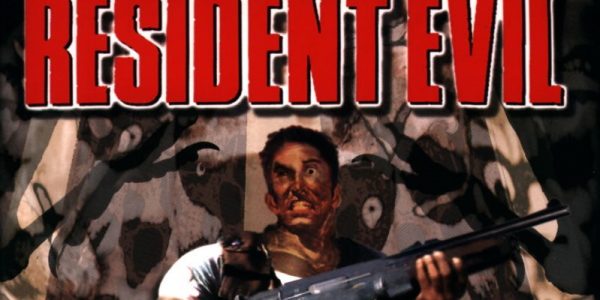
First, a little backstory on the games - the original
Resident Evil was released in 1996 and is commonly regarded as one of the progenitors of the survival horror genre. Critically acclaimed and highly influential,
Resident Evil went to receive numerous sequels and spin-offs, the series as a whole continuing to be one of the biggest and most iconic names in the industry to this day. Early installments focused on zombie outbreaks caused by the T-virus, a bioweapon developed by the fictional Umbrella Corporation.
The original script for a
Resident Evil movie adaptation was penned by none other than the legendary horror icon George A. Romero, whose own
Living Dead film series serves as the primary inspiration for most modern zombie apocalypses and stories - including
Resident Evil.
Romero's script was based on the story of the first game, which followed a group of characters trapped in an abandoned mansion full of zombies and other mutated monstrosities.
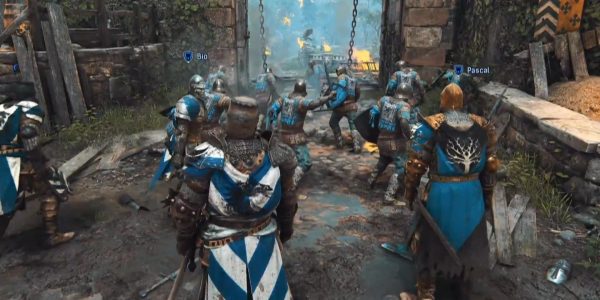
However, that script was turned down and Sony instead opted for Paul W.S. Anderson to take over as the movie's writer and director - he would also go on write and direct every subsequent entry in the series as well. 2002's
Resident Evil featured none of the characters from the games and was set in an underground Umbrella facility called The Hive, instead of the Spencer mansion which was the primary setting in the original game. Mila Jovovich, who would later go on to become Anderson's wife, starred as Alice, a new character that was part of an Umbrella team sent into The Hive after a T-Virus outbreak.
While it's unfortunate that the original game was never adapted to the big screen, the decision to have the movie focus on a separate story that could conceivably take place in the same universe wasn't necessarily a bad idea. 2002's
Resident Evil is not a good movie, not by any stretch, but it's not outright terrible. Its story, while not all that interesting, got enough of the basics of the
Resident Evil universe right (how the T-virus works, the creature designs, the nefarious Umbrella Corporation) and wasn't a disservice to the source material - that was saved for the sequel.
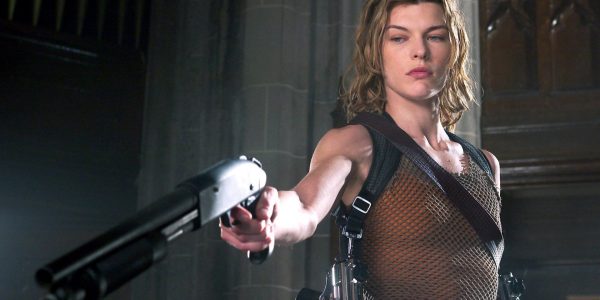
Mixed reviews and decent box office returns ($100 million on a $35 million budget) was enough for Sony to greenlight a second movie, which led to 2004's
Resident Evil: Apocalypse. Set in the fictional Raccoon City during a city-wide T-virus outbreak,
Apocalypse was directly based on the events of
Resident Evil 2 and
3, both of which featured the Raccoon City incident. Prominent characters from the games like Jill Valentine and the Nemesis creature made their big screen debut, but the first movie's protagonist Alice was still the main lead, relegating fan-favorite characters to minor supporting roles at best.
While
Apocalypse certainly looked the part when it came to adapting
Resident Evil, from the use of Raccoon City as a setting to the various character and creature designs, it failed both an adaptation and on its own terms in pretty much every other aspect. Most of the characters backstories and motivations didn't carry over from the games, which meant that everyone except Alice and Nemesis had little to do except resemble the characters they're supposed to be visually.
Apocalypse also introduced the idea that Alice was able to bond with the T-Virus in some way, giving her enhanced strength, reflexes and other superhuman abilities, essentially turning her into the only one character actually capable of affecting the plot in any meaningful way - a recurring problem that would plague every subsequent movie in the series.

While the downwards spiral of the franchise was already well underway,
Resident Evil: Apocalypse was not its death knell. It ended as the games did, with Raccoon City destroyed and Umbrella covering up the zombie outbreak, which meant that theoretically, the story could still be salvaged so that it followed the games more closely, fleshing out the characters that fans of the series wanted to see. Then
Resident Evil: Extinction happened, pretty much destroying all hope for the movie series.
2007's
Extinction opted for a post-apocalyptic,
Mad Max style vibe and setting in which the T-Virus has swept the entire planet, leaving nothing but a desolate wasteland. It was a creative direction that made all of the events of the games' universe impossible to take place, which in turn meant that character backstories simply couldn't occur.
Extinction marked the exact point at which the movie series stopped being an adaptation of
Resident Evil in any way beyond occasional references. It was also a terrible movie with a nonsense plot and characters that were there either to provide a body count or to cheer for Alice, who was the only one that could do anything useful. If the first
Resident Evil was okay at best and the second was horrible, but not irreversibly so,
Extinction was downright franchise assassination.
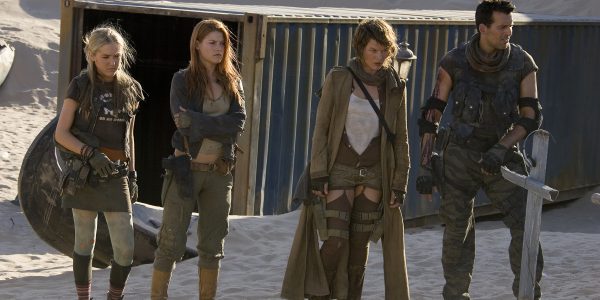
Although it hit rock bottom with
Extinction, the series was still making money, resulting in three more movies -
Afterlife,
Retribution and
The Final Chapter. There's little point in going over them in-depth as they all have the exact same problems - complete disregard for internal or external continuity and logic, threadbare, nonsensical plots, underdeveloped, thinly written characters, overblown action and a desperate need to constantly reference things from the first movie - especially the laser scene. In short, they all follow the template set forth by
Extinction.
It's difficult to believe that all of these movies were written and directed by the same person, considering how little sense they make in correlation to one another. As I pointed out in my review of
The Final Chapter, the overall plot and continuity of the series contradicts itself so much that it's actually punishing people who try to keep up with it. Imagine if Marvel movies made less sense if you'd seen them all and also all of them sucked.
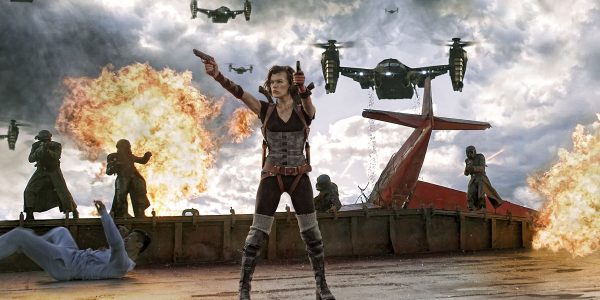
It's a miracle that the series lasted as long as it did, and it probably owes is survival in the latter years to 3D. Cheap 3D conversions and steeper ticket prices certainly helped boost
Afterlife and
Retribution's box office returns.
For as much as I've just railed on it, is there anything good about the
Resident Evil film series? Well, it is the longest running and most successful movie franchise based on a video game, having grossed more than a $1 billion worldwide. In a world where nearly all video game adaptations are critically panned box office flops, any success story is worth noting and the fact that the
Resident Evil series lasted as long as it did and made as much money as it did could pave the way for more big screen adaptations in the future - and that could maybe, just maybe, one day result in some actually good video game movies.
For the most part though, closing the book on the
Resident Evil film series is undoubtedly a positive step. It's a movie franchise that's been running on fumes for about a decade, trying to be dumb fun, but more often than not forgetting the fun part.
In short, good riddance!
 First, a little backstory on the games - the original Resident Evil was released in 1996 and is commonly regarded as one of the progenitors of the survival horror genre. Critically acclaimed and highly influential, Resident Evil went to receive numerous sequels and spin-offs, the series as a whole continuing to be one of the biggest and most iconic names in the industry to this day. Early installments focused on zombie outbreaks caused by the T-virus, a bioweapon developed by the fictional Umbrella Corporation.
The original script for a Resident Evil movie adaptation was penned by none other than the legendary horror icon George A. Romero, whose own Living Dead film series serves as the primary inspiration for most modern zombie apocalypses and stories - including Resident Evil. Romero's script was based on the story of the first game, which followed a group of characters trapped in an abandoned mansion full of zombies and other mutated monstrosities.
First, a little backstory on the games - the original Resident Evil was released in 1996 and is commonly regarded as one of the progenitors of the survival horror genre. Critically acclaimed and highly influential, Resident Evil went to receive numerous sequels and spin-offs, the series as a whole continuing to be one of the biggest and most iconic names in the industry to this day. Early installments focused on zombie outbreaks caused by the T-virus, a bioweapon developed by the fictional Umbrella Corporation.
The original script for a Resident Evil movie adaptation was penned by none other than the legendary horror icon George A. Romero, whose own Living Dead film series serves as the primary inspiration for most modern zombie apocalypses and stories - including Resident Evil. Romero's script was based on the story of the first game, which followed a group of characters trapped in an abandoned mansion full of zombies and other mutated monstrosities. However, that script was turned down and Sony instead opted for Paul W.S. Anderson to take over as the movie's writer and director - he would also go on write and direct every subsequent entry in the series as well. 2002's Resident Evil featured none of the characters from the games and was set in an underground Umbrella facility called The Hive, instead of the Spencer mansion which was the primary setting in the original game. Mila Jovovich, who would later go on to become Anderson's wife, starred as Alice, a new character that was part of an Umbrella team sent into The Hive after a T-Virus outbreak.
While it's unfortunate that the original game was never adapted to the big screen, the decision to have the movie focus on a separate story that could conceivably take place in the same universe wasn't necessarily a bad idea. 2002's Resident Evil is not a good movie, not by any stretch, but it's not outright terrible. Its story, while not all that interesting, got enough of the basics of the Resident Evil universe right (how the T-virus works, the creature designs, the nefarious Umbrella Corporation) and wasn't a disservice to the source material - that was saved for the sequel.
However, that script was turned down and Sony instead opted for Paul W.S. Anderson to take over as the movie's writer and director - he would also go on write and direct every subsequent entry in the series as well. 2002's Resident Evil featured none of the characters from the games and was set in an underground Umbrella facility called The Hive, instead of the Spencer mansion which was the primary setting in the original game. Mila Jovovich, who would later go on to become Anderson's wife, starred as Alice, a new character that was part of an Umbrella team sent into The Hive after a T-Virus outbreak.
While it's unfortunate that the original game was never adapted to the big screen, the decision to have the movie focus on a separate story that could conceivably take place in the same universe wasn't necessarily a bad idea. 2002's Resident Evil is not a good movie, not by any stretch, but it's not outright terrible. Its story, while not all that interesting, got enough of the basics of the Resident Evil universe right (how the T-virus works, the creature designs, the nefarious Umbrella Corporation) and wasn't a disservice to the source material - that was saved for the sequel.  Mixed reviews and decent box office returns ($100 million on a $35 million budget) was enough for Sony to greenlight a second movie, which led to 2004's Resident Evil: Apocalypse. Set in the fictional Raccoon City during a city-wide T-virus outbreak, Apocalypse was directly based on the events of Resident Evil 2 and 3, both of which featured the Raccoon City incident. Prominent characters from the games like Jill Valentine and the Nemesis creature made their big screen debut, but the first movie's protagonist Alice was still the main lead, relegating fan-favorite characters to minor supporting roles at best.
While Apocalypse certainly looked the part when it came to adapting Resident Evil, from the use of Raccoon City as a setting to the various character and creature designs, it failed both an adaptation and on its own terms in pretty much every other aspect. Most of the characters backstories and motivations didn't carry over from the games, which meant that everyone except Alice and Nemesis had little to do except resemble the characters they're supposed to be visually. Apocalypse also introduced the idea that Alice was able to bond with the T-Virus in some way, giving her enhanced strength, reflexes and other superhuman abilities, essentially turning her into the only one character actually capable of affecting the plot in any meaningful way - a recurring problem that would plague every subsequent movie in the series.
Mixed reviews and decent box office returns ($100 million on a $35 million budget) was enough for Sony to greenlight a second movie, which led to 2004's Resident Evil: Apocalypse. Set in the fictional Raccoon City during a city-wide T-virus outbreak, Apocalypse was directly based on the events of Resident Evil 2 and 3, both of which featured the Raccoon City incident. Prominent characters from the games like Jill Valentine and the Nemesis creature made their big screen debut, but the first movie's protagonist Alice was still the main lead, relegating fan-favorite characters to minor supporting roles at best.
While Apocalypse certainly looked the part when it came to adapting Resident Evil, from the use of Raccoon City as a setting to the various character and creature designs, it failed both an adaptation and on its own terms in pretty much every other aspect. Most of the characters backstories and motivations didn't carry over from the games, which meant that everyone except Alice and Nemesis had little to do except resemble the characters they're supposed to be visually. Apocalypse also introduced the idea that Alice was able to bond with the T-Virus in some way, giving her enhanced strength, reflexes and other superhuman abilities, essentially turning her into the only one character actually capable of affecting the plot in any meaningful way - a recurring problem that would plague every subsequent movie in the series.  While the downwards spiral of the franchise was already well underway, Resident Evil: Apocalypse was not its death knell. It ended as the games did, with Raccoon City destroyed and Umbrella covering up the zombie outbreak, which meant that theoretically, the story could still be salvaged so that it followed the games more closely, fleshing out the characters that fans of the series wanted to see. Then Resident Evil: Extinction happened, pretty much destroying all hope for the movie series.
2007's Extinction opted for a post-apocalyptic, Mad Max style vibe and setting in which the T-Virus has swept the entire planet, leaving nothing but a desolate wasteland. It was a creative direction that made all of the events of the games' universe impossible to take place, which in turn meant that character backstories simply couldn't occur. Extinction marked the exact point at which the movie series stopped being an adaptation of Resident Evil in any way beyond occasional references. It was also a terrible movie with a nonsense plot and characters that were there either to provide a body count or to cheer for Alice, who was the only one that could do anything useful. If the first Resident Evil was okay at best and the second was horrible, but not irreversibly so, Extinction was downright franchise assassination.
While the downwards spiral of the franchise was already well underway, Resident Evil: Apocalypse was not its death knell. It ended as the games did, with Raccoon City destroyed and Umbrella covering up the zombie outbreak, which meant that theoretically, the story could still be salvaged so that it followed the games more closely, fleshing out the characters that fans of the series wanted to see. Then Resident Evil: Extinction happened, pretty much destroying all hope for the movie series.
2007's Extinction opted for a post-apocalyptic, Mad Max style vibe and setting in which the T-Virus has swept the entire planet, leaving nothing but a desolate wasteland. It was a creative direction that made all of the events of the games' universe impossible to take place, which in turn meant that character backstories simply couldn't occur. Extinction marked the exact point at which the movie series stopped being an adaptation of Resident Evil in any way beyond occasional references. It was also a terrible movie with a nonsense plot and characters that were there either to provide a body count or to cheer for Alice, who was the only one that could do anything useful. If the first Resident Evil was okay at best and the second was horrible, but not irreversibly so, Extinction was downright franchise assassination.  Although it hit rock bottom with Extinction, the series was still making money, resulting in three more movies - Afterlife, Retribution and The Final Chapter. There's little point in going over them in-depth as they all have the exact same problems - complete disregard for internal or external continuity and logic, threadbare, nonsensical plots, underdeveloped, thinly written characters, overblown action and a desperate need to constantly reference things from the first movie - especially the laser scene. In short, they all follow the template set forth by Extinction.
It's difficult to believe that all of these movies were written and directed by the same person, considering how little sense they make in correlation to one another. As I pointed out in my review of The Final Chapter, the overall plot and continuity of the series contradicts itself so much that it's actually punishing people who try to keep up with it. Imagine if Marvel movies made less sense if you'd seen them all and also all of them sucked.
Although it hit rock bottom with Extinction, the series was still making money, resulting in three more movies - Afterlife, Retribution and The Final Chapter. There's little point in going over them in-depth as they all have the exact same problems - complete disregard for internal or external continuity and logic, threadbare, nonsensical plots, underdeveloped, thinly written characters, overblown action and a desperate need to constantly reference things from the first movie - especially the laser scene. In short, they all follow the template set forth by Extinction.
It's difficult to believe that all of these movies were written and directed by the same person, considering how little sense they make in correlation to one another. As I pointed out in my review of The Final Chapter, the overall plot and continuity of the series contradicts itself so much that it's actually punishing people who try to keep up with it. Imagine if Marvel movies made less sense if you'd seen them all and also all of them sucked.  It's a miracle that the series lasted as long as it did, and it probably owes is survival in the latter years to 3D. Cheap 3D conversions and steeper ticket prices certainly helped boost Afterlife and Retribution's box office returns.
For as much as I've just railed on it, is there anything good about the Resident Evil film series? Well, it is the longest running and most successful movie franchise based on a video game, having grossed more than a $1 billion worldwide. In a world where nearly all video game adaptations are critically panned box office flops, any success story is worth noting and the fact that the Resident Evil series lasted as long as it did and made as much money as it did could pave the way for more big screen adaptations in the future - and that could maybe, just maybe, one day result in some actually good video game movies.
For the most part though, closing the book on the Resident Evil film series is undoubtedly a positive step. It's a movie franchise that's been running on fumes for about a decade, trying to be dumb fun, but more often than not forgetting the fun part.
In short, good riddance!
It's a miracle that the series lasted as long as it did, and it probably owes is survival in the latter years to 3D. Cheap 3D conversions and steeper ticket prices certainly helped boost Afterlife and Retribution's box office returns.
For as much as I've just railed on it, is there anything good about the Resident Evil film series? Well, it is the longest running and most successful movie franchise based on a video game, having grossed more than a $1 billion worldwide. In a world where nearly all video game adaptations are critically panned box office flops, any success story is worth noting and the fact that the Resident Evil series lasted as long as it did and made as much money as it did could pave the way for more big screen adaptations in the future - and that could maybe, just maybe, one day result in some actually good video game movies.
For the most part though, closing the book on the Resident Evil film series is undoubtedly a positive step. It's a movie franchise that's been running on fumes for about a decade, trying to be dumb fun, but more often than not forgetting the fun part.
In short, good riddance!